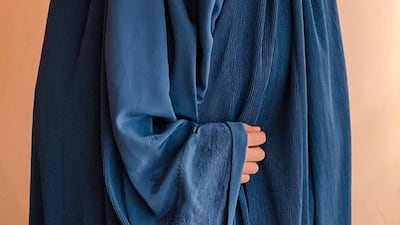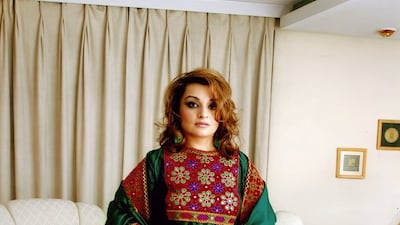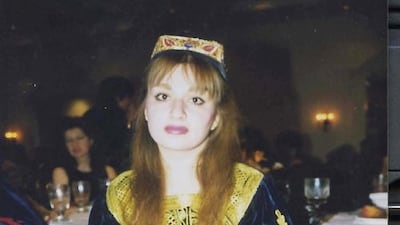Two days before the Taliban swept into her home city of Kabul, Faiza Zeerak's mother bought her and her sister a chadari each.
The 22-year-old never expected to wear the garment, which covers her face. A lover of music, education and US TV series, the social worker falls firmly into Generation Z and feels completely at odds with the Taliban's ideology, which treats women as second-class citizens.
"When I wore it for the first time I felt so sad. It was as if I put a parcel on my head. I had to pull it down with my hands to see through that little net in the front," Ms Zeerak told The National from her home in Kabul.
It wasn't just her clothing she adjusted for her safety. On August 15, when the group took over the city, she fled her job at the charity she founded with her friends to go into hiding. The Kabul University graduate's ‘Smile for Afghan Kids’ charity caters for street children and orphans.
“I lost my job, I stopped my activities which I used to do for kids and youths. I couldn’t do anything! I am just hiding at home and I am still like prisoner,” she said.
Born in 1999 in the northern Baghlan province and then later moving with her family to the capital, she is part of a generation that differs from their elders, who experienced the 1996-2001 rule of the Taliban, brought down by a US invasion.
Back then, music was banned and women were all but erased from public life.
Afghanistan's under-25s, who make up almost two thirds of its 37 million people, have lived a very different life over the past 20 years.
“I am used to listening to music. I have a small black speaker in my room to listen to music. I listen to happy Afghan songs; I don’t like Bollywood music much but in Hollywood I only listen to the happy songs of Selena Gomez," says Ms Zeerak.
"I like watching movies, and American TV series. I had already downloaded some series such as The 100 and Humans to watch them when I am home.”
Now, her life is on a very different trajectory. The social worker has no doubt that the new freedoms that came with the US-led invasion that toppled Taliban 20 years ago are already being taken away or even lost.
She has taken the brave step of talking publicly about how her life, and that of thousands of Afghans, has changed. Seemingly without specific orders being given, people and corporations are already censoring their activities.
“Everyone can see the way they deal with women, music and other basic human rights. All televisions stopped music shows and TV dramas, which are replaced with Islamic programmes,” said Ms Zeerak, an amateur painter who loves drawing with water colours and pencil.
"Entertainment shows have completely vanished from the country. If women don’t work and are active in the society, I can’t think of a stable society only led by men."
Ms Zeerak said she knows a lot of men and women who live in fear of saying what they really think now under the Taliban.
There will be a pandemic of self-silencing, she said. She has already started doing this with her decision to wear the chadari. She fears that departing publicly from the ideology pushed by Taliban will eventually put her life in danger
Ms Zeerak thinks that the Taliban might have become more diplomatic and politically savvy in the way they want to present themselves in 2021 to the world.
But since August 15, the hardline group has been imposing strict rules and its militants have been roaming the streets to enforce the new order.
Just days after the Taliban takeover, images of women on billboards and in shops around Kabul were covered up or vandalised.

During that era, the Taliban banned girls from school, prevented women from working in contact with men and publicly stoned to death women accused of adultery.
Although many women over the past four weeks returned to wearing a niqab or chadari even before the hardline group established new dress rules, others simply stopped going outside the home.
The Taliban haven't yet issued a specific dress code for all women across the country.
Then, on Sunday, Higher Education Minister Abdul Baqi Haqqani ordered gender segregation and mandatory hijabs in higher education. On the same day, a group of pro-Taliban women, reportedly mostly students, gathered at Shaheed Rabbani Education University in Kabul to express support for the country's new rulers.
Taliban militants were also seen in social media posts using whips and sticks against a group of women protesting in Kabul last Tuesday following the announcement of a male-only government.
“We were a bit hopeful before they announced their government but after Taliban announced their cabinet, we have lost hope. They cancelled the ministry of women's affairs from their lists and that says a lot about their outlook towards women, and of course they don’t have any respect for women’s rights,” said Ms Zeerak.
The National’s calls and WhatsApp messages to Taliban spokesmen Zubiullah Mujahid and Suhail Shaheen to respond to questions for this article went unanswered.









